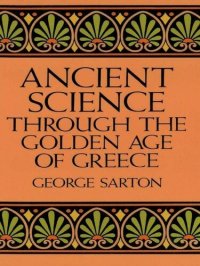
Ebook: Ancient Science Through the Golden Age of Greece
Author: George Sarton
- Genre: History
- Year: 2012
- Publisher: Dover Publications
- City: Mineola
- Language: English
- epub
"There are few scholars or scientists today who write as beautifully or as interestingly as [Sarton] . . . [his] book is magnificent." — Ashley Montagu, Saturday Review
Although science did not begin in ancient Greece (millennia of work in Egypt, Mesopotamia, and other regions preceded Greek efforts) it is nevertheless true that methodic, rational investigation of the natural universe originated largely with early Hellenic thinkers. Thus, the major part of this book is of necessity devoted to Greece. Drawing wherever possible on original sources, Dr. Sarton, one of the world's foremost historians of science, paints a vivid and illuminating picture of mathematics, astronomy, physics, biology, medicine, and other sciences as they emerged from the mists of prehistory and ultimately flourished within the context of Greek society. The book is divided into three parts. Part One begins with the earliest evidence of prehistoric mathematics, astronomy, and other science. Dr. Sarton then describes the achievements of Egypt and Mesopotamia, the dawn of Greek culture and the remarkable flowering of Ionian science in the sixth century B.C. Thales of Miletos, Anaximandrox, and Xenophanes are among the important figures discussed. An entire chapter focuses on the influential doctrines of Pythagoras.Part Two opens with the glory of Athens in the fifth century B.C. and its magnificent achievements in poetry and the arts, philosophy, and science. Described in lucid detail are groundbreaking contributions of Heracleitos, Anaxagoras, Protagoras, Zenon of Elea, Parmenides, Democritos, and many others. Also included in this section are perceptive discussions of geographers and historians of the fifth century (Herodotos, Thucydides, and others) and Greek medicine of the fifth century (chiefly Hippocratic). Part Three focuses on the extraordinary Greek thinkers of the fourth century B.C.: Plato and the Academy, Aristotle, Xenophon and many others, including such important schools of thought as the cynics, stoics, skeptics, and epicureans. Major attention is given to mathematics, astronomy and physics, natural sciences and medicine, Aristotelian humanities, and historiography and other topics. "Of great value to the general historian and an exciting, arresting story for the lay reader. — The Yale Review
Although science did not begin in ancient Greece (millennia of work in Egypt, Mesopotamia, and other regions preceded Greek efforts) it is nevertheless true that methodic, rational investigation of the natural universe originated largely with early Hellenic thinkers. Thus, the major part of this book is of necessity devoted to Greece. Drawing wherever possible on original sources, Dr. Sarton, one of the world's foremost historians of science, paints a vivid and illuminating picture of mathematics, astronomy, physics, biology, medicine, and other sciences as they emerged from the mists of prehistory and ultimately flourished within the context of Greek society. The book is divided into three parts. Part One begins with the earliest evidence of prehistoric mathematics, astronomy, and other science. Dr. Sarton then describes the achievements of Egypt and Mesopotamia, the dawn of Greek culture and the remarkable flowering of Ionian science in the sixth century B.C. Thales of Miletos, Anaximandrox, and Xenophanes are among the important figures discussed. An entire chapter focuses on the influential doctrines of Pythagoras.Part Two opens with the glory of Athens in the fifth century B.C. and its magnificent achievements in poetry and the arts, philosophy, and science. Described in lucid detail are groundbreaking contributions of Heracleitos, Anaxagoras, Protagoras, Zenon of Elea, Parmenides, Democritos, and many others. Also included in this section are perceptive discussions of geographers and historians of the fifth century (Herodotos, Thucydides, and others) and Greek medicine of the fifth century (chiefly Hippocratic). Part Three focuses on the extraordinary Greek thinkers of the fourth century B.C.: Plato and the Academy, Aristotle, Xenophon and many others, including such important schools of thought as the cynics, stoics, skeptics, and epicureans. Major attention is given to mathematics, astronomy and physics, natural sciences and medicine, Aristotelian humanities, and historiography and other topics. "Of great value to the general historian and an exciting, arresting story for the lay reader. — The Yale Review
Download the book Ancient Science Through the Golden Age of Greece for free or read online
Continue reading on any device:

Last viewed books
Related books
{related-news}
Comments (0)